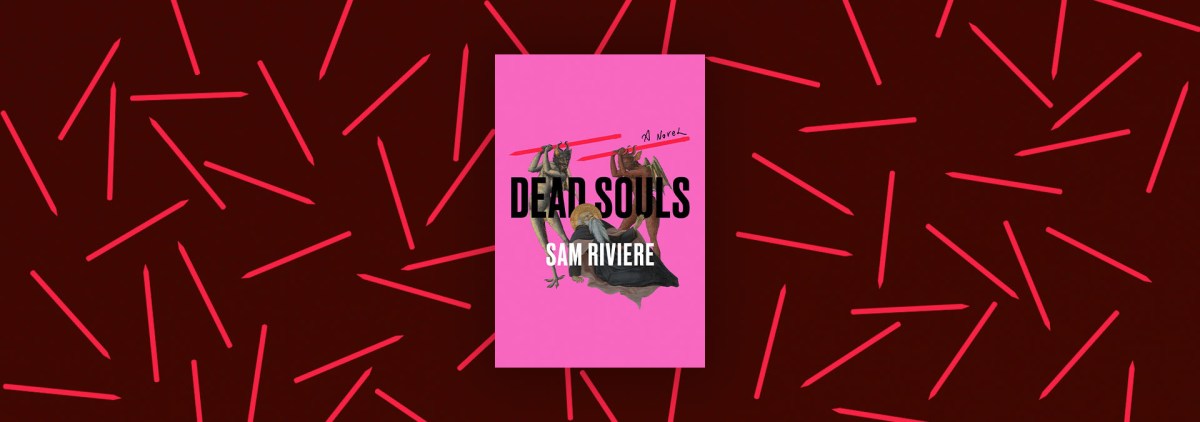[ad_1]
From the earliest pages of English poet Sam Riviere’s debut novel, Dead Souls, the reader is catapulted into an extended internal monologue satirizing the follies of the literary world, particularly its poets. And there’s no winding up to the action: from its beginning, the novel’s pace is manic and relentless, evincing the unnamed narrator’s unreliable, overwrought state of mind. One long paragraph composed of one long, multi-clause sentence after another—all admittedly impeccably written—with no chapter breaks and therefore no orienting signposts creates a demanding reading experience that is not for the uncommitted. Style threatens at times to subsume substance in this novel, but beyond the spectacle of literary and linguistic acrobatics there may be a clever tale to unravel.
For the first eighty or so pages of the novel, our narrator—a lapsed poet several years into a wholesale abandoning of his art—decries the state of contemporary poetry and publishing, the pretense, posturing, and performance. Prompted as he is by an epiphany concerning “the deadly relativity of literary judgments, and the deadly relativity of the value of literary works,” as well as “the undeniable inconsequence of practically all of the literature being produced” (thanks, he bitterly notes, to the proliferation of creative writing programs), he has turned instead to editing a small literary magazine. Having come to the realization that “a poem was actually a pathetically fragile excrescence,” easily shattered with his “little mallet,” he finds some strange sense of purpose in now being “the author of artistic destinies, of careers, of real-life trajectories.”
On the day the story takes place, the narrator is attending the biennial Festival of Culture in London where he hears talk from an industry acquaintance of the mysterious Solomon Wiese, a formerly promising poet now of some disrepute, having twice been accused of plagiarism. Wiese’s fall from grace is precipitated by the development of a sophisticated, futuristic plagiarism detection technology known as the quantitative analysis and comparison system or QACS. Capable of analyzing every nuanced aspect and quality of a literary work’s content and style to the degree that its creators assert the ability to grasp “an absolutely individual fingerprint, the soul of the book,” the system ensures that “no work is brought before the paying public that runs the risk of being exposed as a sham, a copy, on any level a fraudulent document.”
Having been tested by the QACS, Wiese’s poetry manuscript was found in significant breach of the literary world’s new exacting standards. Accused of “crimes against originality,” Wiese fled London for more rural parts of England to plot his comeback. Briefly successful upon his return months later with a series of enthralling live poetry performances, he was soon cut down again by a high QACS score that revealed that his “monologues appeared to have lifted entire passages verbatim, completely uncredited,” from several obscure rural poets. The appropriate form of punishment, the narrator is told by his industry acquaintance, is still to be determined, but will most assuredly be meted out by the “alternative justice system” in a very public way.
This send-up of literary culture’s punishing fixation on originality and the “quintessentially English taste for public humiliation” are central to Dead Souls (the novel’s title itself is lifted from Nikolai Gogol’s famous work), and a topic of some importance to Riviere, who also runs a small chapbook publishing enterprise, If A Leaf Falls Press, that focuses on publishing appropriated writing. In a 2018 interview, Riviere noted that appropriation might be “a way of escaping poetry’s tendency to promote quite prescriptive types of expression, connected to often simplified ideals of ‘authenticity’ and ‘voice’ (where, interestingly, the appropriation of form or address or subject position is completely uncontroversial)—and also of disrupting—in a minor way, humour is definitely part of this—the way literature regards texts and thoughts as definitely owned by certain individuals.”
As poets gather at the end of the festival day in the bar of a Travelodge, the narrator coincidentally stumbles upon Solomon Wiese, and for the remainder of the night, and the novel, he listens to the disgraced poet philosophize about life, love, friendship, destiny, poetry, and something he terms the “nothingness” that has been with him since childhood, as he recounts the events leading up to his present predicament. The increasingly bewildering tale unfolds with multiple bizarre sub-stories involving characters met on his travels, including a couple who train him in data piracy and techno-activism, an old man with scabs on his head who bestows upon him a small fortune, a young poet who attempts to help Wiese resurrect his literary reputation through a poetry app called Locket, and a clique of poets Wiese refers to as the “scholastici.” In telling Wiese’s story, as absurd as it is, Riviere savagely takes aim at academic elitism in poetry, the manufactured divide between urban and rural poets, the role of privilege and family fortune in a poet’s success, and even the tedium of poetry anthologies.
There is, in the end, good reason to wonder if Solomon Wiese exists at all. Billed as a metaphysical mystery, Dead Souls may be a masterful ruse. Is Wiese merely a figment of the narrator’s imagination, a product of a dissociative fugue, a projection of his own crisis of faith in poetry and its worth? The anxiety-soaked final scene of the novel, which leaves the narrator alone, paranoid, pacing on the outside of the Travelodge bar at “a safe distance” from the poets gathered inside and sensing some “judgment…falling towards us like a dark shape from the sun,” suggests that may be so.

FICTION
by Sam Riviere
Catapult
Published May 18, 2021

[ad_2]
Source link
